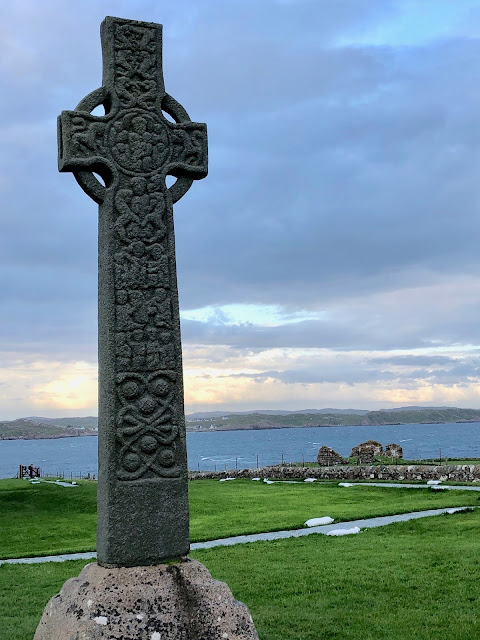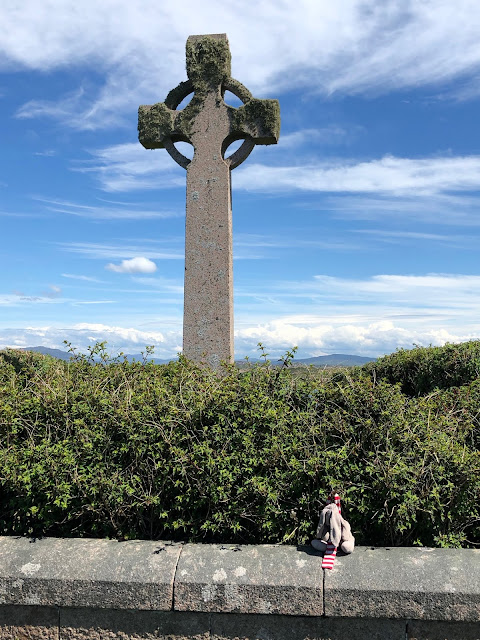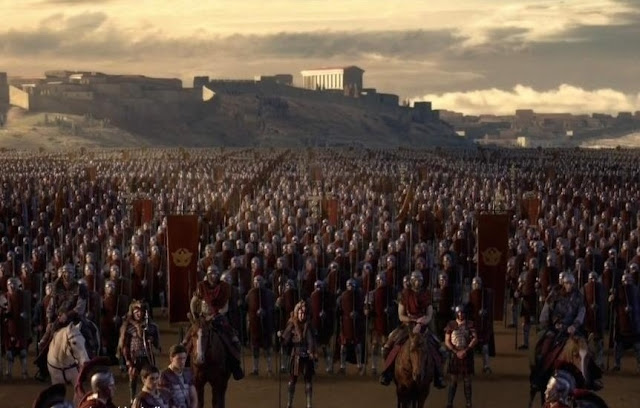One of my very favorite movies of all time, one that turned my then 12-year-old world upside down when it first came out, begins with a silent black screen, and the simple words “A long time ago, in a galaxy far, far away….” Sound familiar?
Then there’s a flourish of trumpets and horns, and against a starry night sky begins the story of a young man living as a farm boy in a harsh, arid, neglected corner of the universe, a boy who has been taught to keep his head down and mind his own business. He then encounters a wizened old prophet who will call him as his pupil—his disciple, as it were, even. Who will cause him to leave behind everything he has ever known in a quest to save the universe from the brutal power of empire, tyranny, and evil.
As in all quests, the young man gains a deeper knowledge of himself and his potential, overcomes self-doubt and loss, finds exceptional inner strength through faith in a cause outside himself, and comes fully into his own independent identity as an unlikely hero. I don’t know.
Maybe you’ve heard of it? But the movie has become so embedded in our modern culture that there’s even Episcopal jokes about it, like this one: you know you’re in a room full of Episcopalians when someone says, “May the Force be with you,” and the answer immediately that comes back from everyone is “And also with you.”
But the layout of the story was far from new, as even the writer/director of it would admit. And in today’s reading from 2 Kings, we get the end part of a story that is remarkably similar to that of the young hero named Luke. We get the story of how Elisha takes over after the great prophet Elijah, who is his mentor, is carried off into heaven and taken from Elisha, much like Obi-Wan Kenobi suddenly disappeared in his battle with Darth Vader on the Death Star.
But you may not remember how the story started, so I want to share that with you today.
Once, long ago—thousands of years ago, actually-- there was a boy out plowing in the field with 24 oxen, plodding along side by side in 12 sets of two. This was the boy’s life—staring at the butts of oxen all day, trying not to slip in their poop, trying to keep them plowing a straight path under the broiling sun, carrying water for them, trying to get them to engage in very un-oxen-like behavior by pulling a plow all day rather than finding a nice mud puddle in the shade and just chilling. This was the boy’s life—and it will tell you something about how different our world is from the world of this boy that that job was actually a pretty good one at the time.
This kid was actually pretty lucky. Unlike many kids then and even now in our world, he had a mother and father. He had a home. He had a field—which needed to be plowed and planted and harvested. But this was a good life. It was as secure as any life in the 9th century BCE could be. I mean, if worse came to worse, you at least had a field, and had oxen, and had a job.
One day, though, a crazy-looking old man came wandering up over the hill, and stood watching the boy plowing. The boy was so engrossed in his task he didn’t notice the old man until he was close enough to smell him. And--phew! The crazy old dude smelled worse than the oxen!
But there was a strange blue light in the old man’s eyes. There was a silence and stillness and power within him, and it brought that boy and his oxen to a halt as if they’d dropped anchor. The crazy old man may have had hair that stood out all over his head like a halo, but he also had on a fine mantle that stood out from the rest of his dust-stained, sweat soaked clothes, thrown over his shoulder casually. That mantle also caught the boy’s attention. As Han Solo would later remark, Who WAS this old fossil?
The man looked into the boy’s eyes, and some sort of strange shiver went through the boy as if he had just dived into a cool spring on a hot summer day. Without a word, the old man threw his mantle over the boy, and the boy knew. He just knew he had to follow this old man. Dreams danced before his eyes as that mantle touched his shoulders. Power coursed through him like a lightning strike and it was almost painful, contracting his muscles.
But he was a good boy, and wanted to not worry his parents, so he spoke first, and asked if he could kiss his parents good-bye. The old man turned, almost triumphant at this sign of what he considered to be doubt—what any of the rest of us would consider to be good common sense. I mean, this kid could have ended up side of an ancient equivalent of a milk carton!
“Do what you want. What’s it to me?” the old man hissed, and he whipped his mantle off the boy’s shoulders and turned and stalked off as if he had won a bet with someone and wanted to collect.
This response stung the boy. So he decided to show this old man he was serious. He took those oxen, still hitched to the plow, and slaughtered them, and then fed them to his dumbstruck neighbors, kind of as a parting gesture that probably made them think he had lost his mind.
There was no going back to plowing now, though. He then ran off and followed that crazy old man, serving him and the God the old man served, leaving his former life behind without a backward glance. That old man was the prophet Elijah. And that boy was Elisha. Elijah was one of the greatest prophets in all of Israel—which means he was also one of the most hated and most feared men in the land, because prophets tend to be bearers of bad tidings and ill portents.
God usually doesn’t send prophets around to proclaim that everything’s rosy. Prophets are called to speak God’s word to the powerful who have shut their ears and their hearts to anything but their own desires, their own lust, their own muscle, their own bellies. Responding to God’s call to preach and prophesy like that probably would at least give most people pause. Prophets like Elijah literally gave their lives to God, which didn’t mean that things were easy for them.
Even after Elisha was at Elijah’s side, Elijah kept telling truth to power. He kept rebuking the rich and powerful for their idolatry, for their worship of other gods—gods like Baal, a local storm god. Gods like greed, and oppression, and prejudice, and malice. And Elisha was swept up with along with Elijah, spending his life staring at the back of a crazy old man, and doing the old man’s dirty work, all on the old man’s say-so.
This is the backstory for our first reading from 2 Kings today, which tells the story of Elijah leaving Elisha a few years after Elijah called Elisha away from his plow, his oxen, and his home. Elisha has given everything up to follow Elijah, and not just follow Elijah, but take up the unfinished task of ministry and truth-telling that God still needs embodied in the world. Elisha knows that Elijah is going to be taken from him. He is concerned he is not up to the task.
Elisha has been faithful—and even stubborn in following Elijah as his protégé and disciple. Three times, Elijah tried to shake off Elijah in our story—and three times he flatly refused to turn back. Yet how can he go on by himself? He betrays his worries by asking for a double share—the eldest son’s portion- of Elijah’s spirit. Elisha asks for this double portion because he is afraid he is not up to taking up Elijah’s ministry—and he knows he is going to need help.
The reading from 2 Kings closes with Elijah being taken up to heaven by a chariot of fire, even as Elisha struggles to keep his eyes on the old man as he disappears into the clouds in a dazzling display of light. When the glare wears off, Elisha looks down and sees the old man’s mantle—that same mantle Elijah had draped on his shoulders back when he was just a farm boy plowing the fields—laying at his feet. And so a final decision: should Elisha take up that mantle, and thereby also commit himself to continuing speaking truth to power?
Now, here we are living half a world away and thousands of years beyond the stories of the ancient prophets of Israel. Most of us no longer worry about whether the harvest will be good, or if an invading army will sweep in and carry our loved ones off into captivity. The only oxen most of us see are in the zoo or as a piece of meat in a really expensive bowl of soup. What have we got in common with characters like Elijah and Elisha living in their dusty backwater that literally ends up being the nowhere at the corner of three great empires—the 9th century BCE version of “flyover country?”
Maybe nothing. But isn’t it possible, that for all our modern context, many of us still walk around in circles, staring at the ugly ends of the brutish animals in front of us, going through our daily lives, adjusting ourselves to the scenery, no matter how disgusting or appalling it might be? Isn’t it possible that some in our society go around engaged in extolling themselves to the oppression of others, and others look away rather than work for the common good? And isn’t it possible that times like these call for people who can speak those truths about justice, equality, and hope—people who can dream dreams, and point the way, and pull back the curtain on our divine spark to encourage us to act on a faith that we as a society can be better?
Times like these call for prophets. Times like these call for healers and workers of miracles, even if one of those miracles is simply loving the people others say are unlovable with everything you’ve got. Times like these call for someone who can speak God’s truth into the world, even if that truth may seem to be the last thing the world wants to hear. Dare we consider taking up that same mantle today?
And how does this relate to our gospel? It’s kind of a harsh-sounding gospel, at first. Three times someone approached Jesus and says they will follow him—only to be told that, like Elisha, they’re going to be throwing in their lot with someone who has no place to lay his head To be told that they are not even to say goodbye to their loved ones—as even Elisha got to do with those roast oxen. To be told that even the strict responsibility of a son to bury his father was to be cast aside in the name of discipleship. That doesn’t sound like good news. Can we leave everything behind for the sake of the call to follow Jesus?
I ask myself that question as much as I ask it of you, because Saturday is the 2nd anniversary of my ordination to the priesthood, alongside my friends and companions Maria Evans and Andrew Suitter—we’re known as the Littermates, in case you hadn’t heard. And I awoke yesterday morning to see greetings from my friends Andrew and Maria, and it sent me back into looking at the photos of that warm June night 2 years ago almost right exactly at the time of the 505.
We were blessed to have the Rev. Becca Stevens as the preacher for our ordination. She, too, is an Episcopal priest, and a role model—the founder of Thistle Farms, which is the model for a St. Louis branch of this social enterprise called Bravely, formerly known as Magdalene St. Louis. Thistle Farms and her sister organizations across the country seek to help women escape life on the streets by empowering them, by giving them a home for two years while they live in community, have access to medical care and support and eventually job training, selling home and beauty products which are themselves natural and made by women all over the world.
For twenty years Becca has worked to fulfill this ministry while being the chaplain at Vanderbilt University and raising a family. She was named one of 10 CNN Heroes of the year in 2016 for her work—you can search Youtube for CNN Hero Becca Stevens to see their tribute to her.
I was listening to her sermon again this morning at our ordination—grateful my husband recorded it for me. Once you get past my mom’s Big Hair looming like an apricot boulder in the foreground (she’s a Big Hayered Oklahoma Lady-- if you’ve met her you know what I mean) this recording isa great gift. The sermon was funny and loving and down to earth and wise, just as Becca herself is.
Becca talked about the readings we had chosen for the night, and characterized them this way: Lay down your life, and be happy about it. She told a story about how her mother used to tell her to wash the dishes, but be happy about it, and she felt like responding that she could ether do the dishes or be happy, but not both at the same time. She called this kind of call, which we see reflected in our reading from Luke today too, the "oxymoronical good news."
She talked about how the stoles we would wear as priests would be the way that God would take a hold of us and lead us—where exactly? We didn’t know. And I thought about how happy I was as she preached, and as I knelt there with Andrew and Maria and also how very scared, not knowing where we were going to end up or what we were going to do, as the hands of numerous priests of this diocese pressed down on us one after another and felt my head buzz. I felt like I was toeing the edge of a cliff, exhilarated and daring and a bit or maybe a whole lot stupid and foolish all at once.
I had no idea at that time that two years later, I would be here with you. And I have promised to lay down my life alongside you all in service together, pulling together as a team not for the sake of ourselves, but for the sake of the truly good news of Jesus, and for the sake of the world that begins right inside our hearts and right outside these doors. But I will tell you this—I certainly AM happy about it.
Because another thing we have to remember when we hear this gospel today: we are never alone in laying down our lives in this way that Jesus calls us to walk in. We have each other. Just like Jesus, just like Elisha, just like Luke Skywalker, we are not alone in our calling, but have each other gathered around us, supporting each other, in this communion of saints known as the Church writ large with a capital C.
May we have faith enough in the promise of God to be with us, and put our feet on the warm dry ground of that pilgrim path. Take up your power. Step out in faith and hope, knowing that God’s call to us to take our part in the salvation story is a sign of God’s amazing faith and trust in us, even more than our sometimes wobbly faith in God. Sing out the glory of God’s loving-kindness that walks alongside us even when we feel most alone. Take up your mantle. It’s laying at your feet for a reason.
Amen.
Preached at the 505 on June 29, and at 8:00 and 10:15 am on June 30 at St. Martin's Episcopal Church, Ellisville.
Readings:
2 Kings 2:1-2, 6-14
Psalm 77:1-2, 11-20
Galatians 5:1,13-25
Luke 9:51-62




















